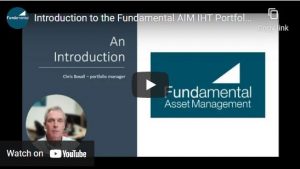The Fundamentals #7 – 10 reasons to invest with Fundamental Asset Management
In the seventh of our series – The Fundamentals – about going back to the basics of investing in AIM shares for Inheritance Tax (IHT) planning purposes, we look at reasons to invest with Fundamental Asset Management.
If you or your client already invests with us, we hope you don’t mind us reminding you what makes us different.
10 Reasons to invest with Fundamental
1. Same portfolio managers since founding in 2004.
2. Our in-depth research seeks out the best investment opportunities on AIM.
3. Experience and expertise, gained through several stock market cycles, along with our outstanding customer service, makes Fundamental Asset Management one of the most successful AIM managers for tax efficient investing in the UK.
4. Personal service with resources such as market insights and direct contact with our portfolio managers.
5. “Core and Satellite” investing approach provides exposure to larger AIM stocks as well as smaller companies with higher growth potential.
6. Excellent value for our clients; a fully tailored portfolio service.
7. Client retains access – assets remain in client’s own name – so no loss of control and client has freedom to redeem part or all if needed.
8. Significantly outperformed the AIM market since inception in 2004, but monthly returns have exhibited less volatility.
9. Support to estates after a client has passed away. At a difficult time, we provide the information HMRC requires at no additional charge.
10. One of the most competitively priced products in the market providing excellent value.
For more information about reducing Inheritance Tax by using Business Relief (also know as Business Property Relief) click here.
If you have any questions, please do not hesitate to contact our Business Development Manager Jonathan Bramall via email [email protected] or phone 01923 713 894
The Fundamentals Series
- Introducing The Fundamentals series
- The Fundamentals #2: How to use ISAs for Inheritance Tax (IHT) planning?
- The Fundamental #3: The perils of exit fees & support for a client’s estate
- The Fundamentals #4 – What is the Fundamental AIM Inheritance Tax Portfolio?
- The Fundamentals #5 – How to use AIM to stop HMRC taking money from your family?
- The Fundamentals #6: How long do you need to hold a qualifying stock for to receive IHT relief?
Our Educational Webinars also provide plenty of further information.
Fundamental Asset Management
www.fundamentalasset.com



